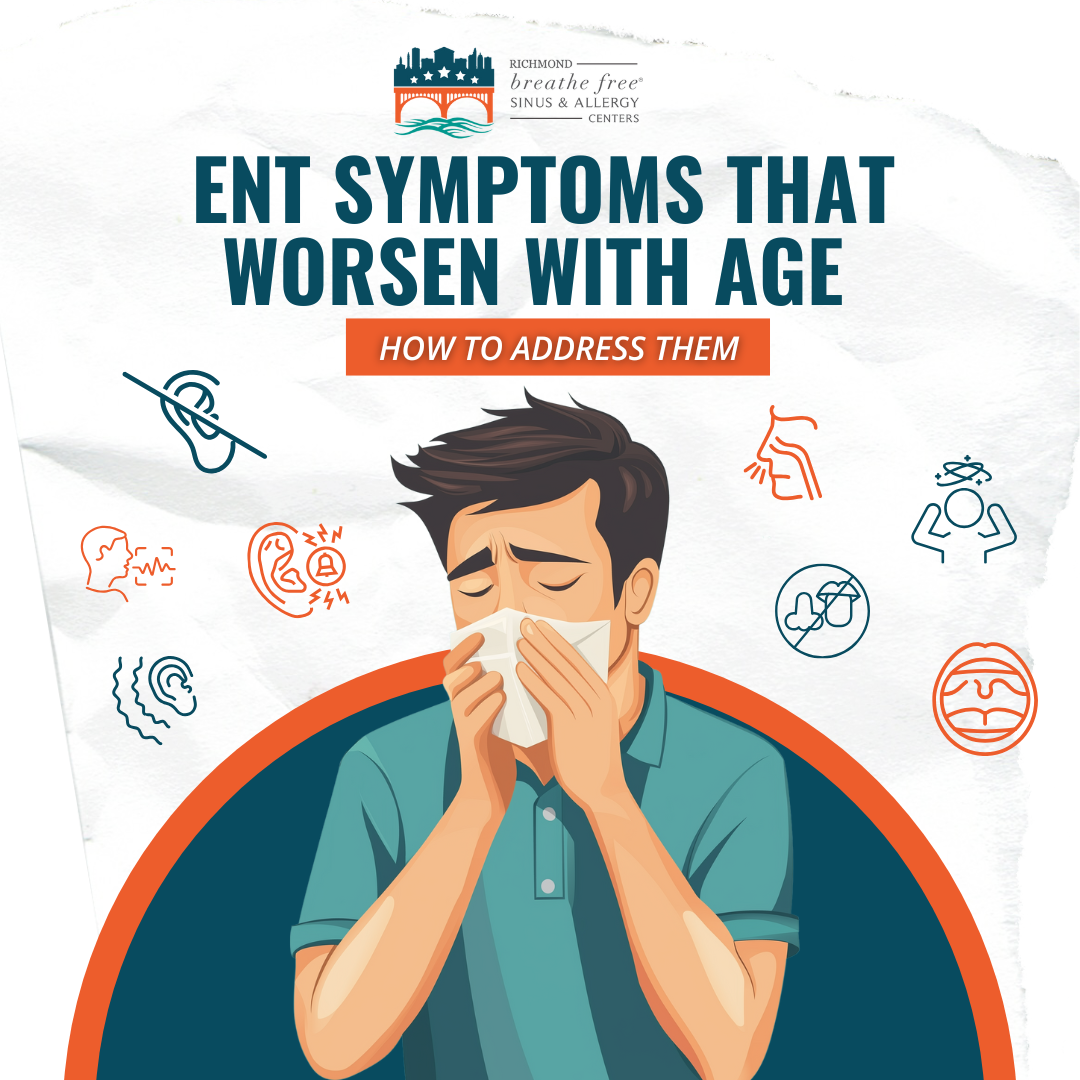ENT Symptoms That Worsen With Age and How to Address Them
As we grow older, our bodies change. Many older adults become more vulnerable to various health issues as they age. ENT health is no exception to this.
As our bodies change, so do our ears, nose, and throat. ENT symptoms and issues can worsen with age, and it is crucial to know what symptoms to watch out for so you can address them accordingly.

Here are ENT symptoms that can worsen with age and what you can do about them:
- Hearing loss
Hearing deteriorates with age. Age-related hearing loss, also known as presbycusis, is perhaps the most common ENT issue faced by older adults and seniors. Approximately 15% of American adults (that’s about 37.5 million) over the age of 18 report some type of hearing issue. About one in three people in the US between 65 and 74 years old have hearing loss.
As people age, they experience the gradual decline of their hearing ability, especially with hearing high-pitched sounds or communicating in loud environments.
Regular hearing tests are crucial to monitor and detect the early signs of hearing loss. Early detection will allow your care provider to implement early medical interventions so that you don’t have to completely lose your ability to hear.
- Tinnitus
Tinnitus is another problem many older adults face. It is characterized by a ringing or buzzing sensation in the ears without an external source. It can be closely associated with age-related hearing loss. This buzzing sensation can go from mildly annoying to extremely distressing.
- Ear infections
Older adults are more prone to ear infections, particularly those affecting the middle ear. As we age, the immune system may weaken, increasing vulnerability to infections. Respiratory illnesses like the flu or the common cold can also heighten the risk.
You can take proactive measures to avoid ear infections: avoid using a Q-tip or any pointed instrument to clean the ears, make sure the ears are dry after showers and baths, and do not hesitate to consult with your doctor if something feels off in your ears.
- Sinus issues
As people age, the linings of the sinus and nasal passages become increasingly dry. This increases the risks of inflammation, nasal congestion, and sinusitis. And with a weakened immune system over time, older adults and seniors become more susceptible to sinus infections.
This can be managed by running an indoor humidifier to add humidity to the air and reduce the swelling and inflammation of the sinus linings. Nasal sprays and steam therapy can also provide comfort. If symptoms persist, your doctor might recommend other treatments like antihistamines or corticosteroids.
- Throat disorders and swallowing concerns
As we age, our body’s ability to swallow can be significantly affected. As we age, the muscles involved in swallowing can weaken, making it more difficult to move food and liquids from the mouth to the stomach. A slower swallowing reflex can also increase the risk of choking or cause food to linger in the throat.
Older adults can manage this age-related issue by taking smaller bites and ensuring that they chew their food more thoroughly. Eating at a slower pace can also help. Additionally, proper hydration can help the tissues in the throat function properly, so make sure you drink plenty of water throughout the day.
- Changes in the ability to smell and taste
Older adults may experience changes in their ability to smell and taste, as both taste buds and scent receptors can become less sensitive with age. Certain medical conditions, such as Alzheimer’s disease or Parkinson’s disease, can also affect these senses.
If the change is related to a medical condition or medication, adjusting treatment may help. Otherwise, incorporating more herbs, spices, and flavorful ingredients into meals can enhance the eating experience.
- Voice changes
Our vocal chords naturally lose elasticity and strength as we age. This leads to voice changes, hoarseness, and pitch changes. Most cases are not serious, though they might need some getting used to.
- Dizziness, vertigo, and balance issues
Feeling dizzy and off-balance is a common ENT issue in older adults. It’s a serious issue and can increase the risks of falls. Some cases may be due to inner ear infections or medication side effects.
Vertigo, a type of dizziness, also becomes increasingly common as we age. Benign paroxysmal positional vertigo (BPPV) is a common cause of vertigo in seniors.
- Sleep apnea
Sleep apnea is a sleep disorder characterized by repeated and temporary breathing pauses during sleep. It occurs when the muscles in the upper airway relax and block the airways. The risk of sleep apnea increases with age, and many wake up gasping for air or suffer from daytime fatigue.
- Head and neck cancers
The risk for head and neck cancers increases with age. Regular check-ups are essential to get ahead of it. Be wary of early signs of problems including lumps in the neck, sudden voice changes, neck pain, difficulty swallowing, and mouth ulcers.
Richmond Breathe Free Can Help With Age-Related ENT Concerns
If you notice anything out of the ordinary, do not hesitate to consult with your care provider. At Richmond Breathe Free, we understand the unique ENT needs of our older patients and their unique circumstances that make them more susceptible to several ENT issues.
Our team is deeply committed to providing you with effective treatments and guidance to detect early signs of ENT issues. Schedule an appointment with us today and don’t let ENT problems affect your life.

